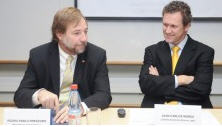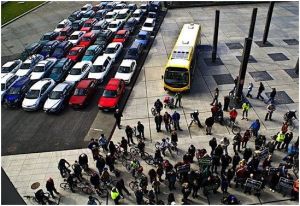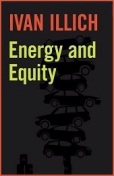As is or at least should by now be well known, a transportation “system” is well more than a collection of largely free-standing bits of infrastructure, modes, links, agencies, institutions, operators and more. It is in fact a textbook example of a disorganized complex system, or more specifically a vast, chaotic but ultimately manageable ecosystem. And if it is our ambition — which it should be — to construct, or rather reconstruct, our city transport systems into functional high-performing sustainable ecosystems. it can help to build up our understanding of the process in steps. Continue reading
Continue reading
First-Line Resources
- - > Helsinki Project - - > Mission Statement - - > Facebook - - > Twitter - - > EBT Program Library - - > Equity photo album - - > Equity/Transport videos - - > World Streets on EquityAdvisory Council
Latest Tweets
Tweets by EquityTSister Programs
 From World Streets
From World Streets- NOW!! 17 plus 1 reasons why I am prudently optimistic about the World Climate / Mobility / Work Transition for 2021/22
- “The Future Office Is Not About Place”
- *** WORLD STREETS INTERNATIONAL ADVISORY COUNCIL *** (to be updated, with full approval) _ _ _
- SAFE CITY STRATEGIES : MANAGING THE TRANSITION. (Working notes for a wide-open 2022 Collaborative Thinking Exercise)
- NEW 2030 ICELAND CLIMATE ACTION PLAN ANNOUNCED
- From Australia Archives: 41 Measures to Manage Traffic Congestion in your City
- World Streets Open 2021 Team Problem-Solving Initiative: Climate/Emergency Mobility/Space Jobs/Work Streets/Cars Private/Shared Vision/Strategy Equity/Women Action/Manage
- Why There Will Be Far Fewer Cars, But Many More Miles Driven
- Op-Ed: Coronavirus has exposed the fragility of auto-centric cities
- A CRISIS IS A TERRIBLE THING TO MISS
 From Safe Streets
From Safe Streets- Transportation Innovation and Reform: Finding the Way to Social Sustainability
- World Transport Policy & Practice – Vol. 18, No. 1
- We’ve never needed geniuses more than now.
- Weekend Musing: Less, More and Mozart
- Transport, Equity and Safe Streets: A Tale of Two Cities
- Late Night Thoughts on Equity from Helsinki
- Editorial: On the plane to Helsinki
- Crowdsourcing Equity/Transport/ Helsinki
- Equity/Transport 2012: Road map for Helsinki Stage 1
- Helsinki Focus Group Workshops – First guidelines
Useful Links
(Section to follow)Equity Reading Room






 In 1974 the genius, erudite, courageous thinker and social visionary Ivan Illich wrote a small paradigm-challenging book entitled “Energy and Equity”, the entire contents of which is presented here. The entire second half of the book is given over entirely to a reflection on transportation and equity, so what could be more appropriate to this project as we get underway for us to have some understanding of what this great mind had to say on our topic – a full generation ago.
In 1974 the genius, erudite, courageous thinker and social visionary Ivan Illich wrote a small paradigm-challenging book entitled “Energy and Equity”, the entire contents of which is presented here. The entire second half of the book is given over entirely to a reflection on transportation and equity, so what could be more appropriate to this project as we get underway for us to have some understanding of what this great mind had to say on our topic – a full generation ago. 




 A collaborative network activity such as World Streets needs to find its own best combination of Sir Isaiah Berlin’s variant on the Greek parable of the Hedgehog and the Fox (“the fox knows many things, but the hedgehog knows one big thing”). Given the huge information overload with which we live in this highly strung twenty-first century, it is absolutely critical that we play the hedgehog and stick rigorously to our topic. But… at the same time the many sided reality is that our topic by its very nature requires us also to be a fox. Thus are the contradictions and challenges of maturity.
A collaborative network activity such as World Streets needs to find its own best combination of Sir Isaiah Berlin’s variant on the Greek parable of the Hedgehog and the Fox (“the fox knows many things, but the hedgehog knows one big thing”). Given the huge information overload with which we live in this highly strung twenty-first century, it is absolutely critical that we play the hedgehog and stick rigorously to our topic. But… at the same time the many sided reality is that our topic by its very nature requires us also to be a fox. Thus are the contradictions and challenges of maturity. 






